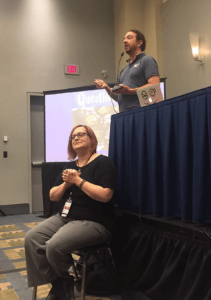…
A roomful of people … at Future Con got a crash course in wizarding DNA — and the basic workings of genetics — on June 17, at a talk hosted by Eric Spana, an assistant professor in the Department of Biology at Duke University, in North Carolina.

Is the wizarding gene recessive? Hagrid, the half-giant-half-wizard groundskeeper at Hogwarts, proves that it isn’t, according to Spana. Giants have no magical ability, and Hagrid was born to a giant mother and a wizard father. For him to be born a wizard with only one copy of the wizard gene in his DNA, magical ability would have to be a dominant trait, said Spana.
…
If the wizarding gene is working correctly, it makes a certain type of protein. The phenotype…is magical ability. But if there’s a mutation in that gene — Spana suggested calling it the “SQUIB” mutation — a different type of protein turns the magic gene off. If one parent’s DNA carries a copy of the SQUIB mutation, it can turn off the wizarding protein, which cancels a child’s ability to do magic.
“We do this in fruit flies all the time,” Spana said, referring to manipulation of heritable traits in general….
The GLP aggregated and excerpted this blog/article to reflect the diversity of news, opinion, and analysis. Read full, original post: Genetics of Wizardry: Were Harry Potter’s Magical Powers Written in His DNA?































